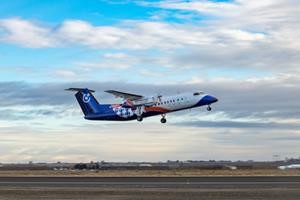News
Plug Power's H2 fuel cell powers airliner at Washington airport
Plug Power, a leading provider of turnkey H2 solutions for the global green H2 economy, announced the historic flight of a regional airliner powered by the company’s line of ProGen fuel cells.
Led by Universal Hydrogen, the H2 fuel cell-powered flying testbed took off at 8:30 a.m. for 15 minutes at Grant County International Airport in Washington state. Reaching an altitude of 3,500 ft MSL, the flight marked a significant milestone for both companies that partnered to make H2-powered aviation a reality.
The 40-passenger airplane’s powertrain is built with Plug’s ProGen that have been adapted for aviation use. Plug's ProGen fuel cells support light, medium and heavy-duty electric vehicles in asset-intensive applications. They have proven to be ideal because they allow fleets to achieve greater range. Fuel cells are also free of carbon emissions, and weigh and cost less than batteries.
“Plug is proud to be a part of Universal Hydrogen’s significant day in aviation history,” Plug CEO Andy Marsh said. “We’ve long said H2 can power applications, such as planes, while reducing toxic carbon emissions. Today, we proved it, and we’re one step closer to a more sustainable future.”
The celebrated day stems from Plug’s long-time partnership with Universal Hydrogen that expanded in 2021 to begin the development of fuel cells made for regional aircraft. The partnership is one of many strategic investments Plug has made in recent years to grow the green H2 economy and expand its applications, including into aviation.
“Our business model resolves the chicken-and-egg problem between H2 airplanes and H2 infrastructure by developing both in parallel and with a uniquely low-cost approach,” said Paul Eremenko, Universal Hydrogen co-founder and CEO. “The airplanes are converted to H2 using an aftermarket retrofit conversion kit, tackling the existing fleet rather than developing a brand-new airplane. And H2 fueling uses modular capsules compatible with existing freight networks and airport cargo handling equipment, making every airport in the world H2-ready.”
Conducted under an FAA Special Airworthiness Certificate, the flight was the first in a two-year flight test campaign expected to culminate in 2025 with entry into passenger service of ATR 72 regional aircraft in a 56-passenger configuration converted to run on H2.


